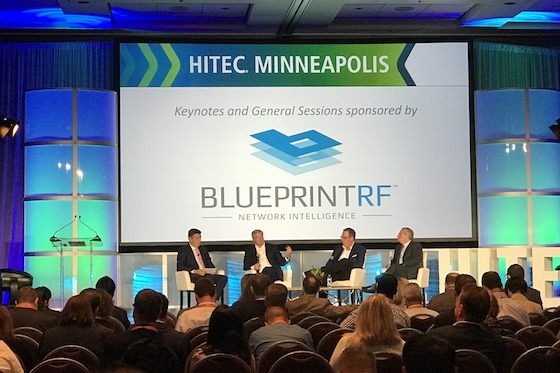Maybe next year: The CEOS on the “Technology talk in the C-suite: 2020 and beyond” panel at HITEC 2019 couldn’t quite bring themselves to call themselves technology companies.
“I wouldn’t say we’re part of the tech industry, but I think the tech industry is engaging with hospitality,” said Ken Greene, Americas president at Radisson Hotel Group. “The way we engage with guests, the way we operate, technology plays an overarching role.”
“I do think brands have an obligation to really be on the cutting edge of tech and … being an innovator and part of it,” said Greg Mount, president and CEO of RLH Corp., which recently created a lab that Mount described as a skunkworks for innovation. “The ways that we’ve done things in the hospitality industry for the past 30, 40 years are about to change. And if you aren’t a part of that, you’re probably going to be left behind.”
“Bottom line, it’s a people-serving-people business, and people today use technology,” said Peter Strebel, president, Omni Hotels & Resorts.
“Mobile is taking over everything,” Strebel said, in answer to a question from moderator Chip Rogers, president and CEO of the American Hotel & Lodging Association. It’s taken over the three CEOs, as well – none has a desktop, and all three work primarily on either mobile devices or laptops.
“Mobile has created an opportunity to connect 24/7, and it has created a way to personalize our connections in a way that we never have been able to do before,” said Mount.
On the thorny topic of data security, the CEOs were circumspect on what the industry should do next, especially in the wake of the highly publicized Marriott International breach.
“In some cases a breach can cost a company dearly,” Mount said. “Our board gets updated on our security efforts every quarter, because it’s that important and can have that much impact to a company.”
“At some point it’s going to get to the point where people will revolt,” Strebel added. “I just know that humans need to feel safe and secure. And every day you probably feel literally less safe and secure because of the way data is being dragged up by everybody.”
Trend or fad?
The CEOs, gathered this week at HITEC’s U.S. conference in Minneapolis, Minnesota, diverged on a question about what the most significant change the industry will see in the next five years.
For Strebel, it’s voice activation and wearables. For Mount, it’s distributed ledgers, or databases spread across computing devices. “It’s going to connect, more directly, the consumer with the hotel. Quite frankly, it could be as big or bigger than the Internet,” he said.
“There is so much technological innovation happening that it’s hard to predict what is actually a trend and what is actually a fad,” Greene conceded.

But robots won’t be replacing human interaction any time soon. “Technology becomes a tool for the folks in the hotel to help interact with the guest on a meaningful platform in the way they want to interact,” Mount said. “It’s more of a support and a help, and it moves things through the process more efficiently.” Technology doesn’t usurp guest interaction, it enhances it, he said.
“Technology is the easy piece,” said Green who emphasized the importance of training employees to use technology to its full potential, and delivering results to consumers in a consistent way at every brand property is the most difficult piece.
The consistency comes down to the basics, including WiFi. “If you don’t have (fast, reliable) WiFi, people won’t even stay with you,” Strebel said. And plentiful outlets, Rogers added: “There’s nothing more frustrating than to get into a hotel room and wonder where to plug something in.”
What’s the biggest challenge surrounding tech in the hotel industry?
“Our biggest challenge is how much technology to introduce,” Omni’s Strebel said. “We never adopted kiosk check-in. We really try to focus on the basics.”
“A number of innovations have been deployed (in our industry) that just don’t work,” Mount said. “For us, our check-in and keyless entry actually work. What worries me is that (tech) has to work.”
For Greene, it’s data security and training, and making sure younger travelers’ expectations around their tech experience in other industries like retail, are matched in the hotel space.
“It’s a real follower, me-too industry in a lot of ways,” Mount said. “I don’t really worry about fads, because if you’re innovative and thinking about what’s next and helping educate consumers about what they should want and should expect versus following everyone else is doing out there is really the right process… I’d rather think about what’s innovative and what should that consumer want when they’re traveling.”
